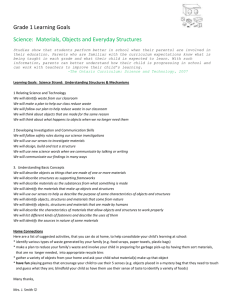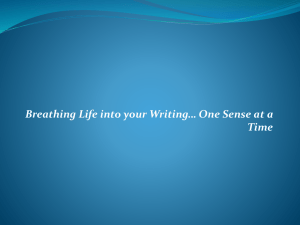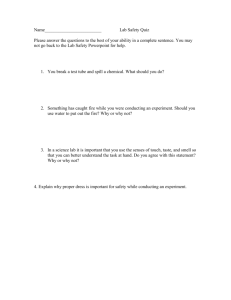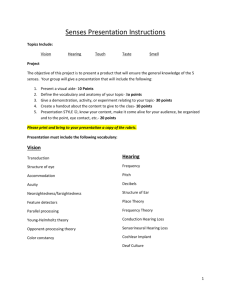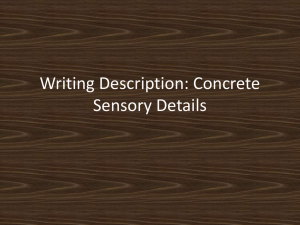March 30 2014, 4 Lent, Year A..(in Word DocX format)
advertisement
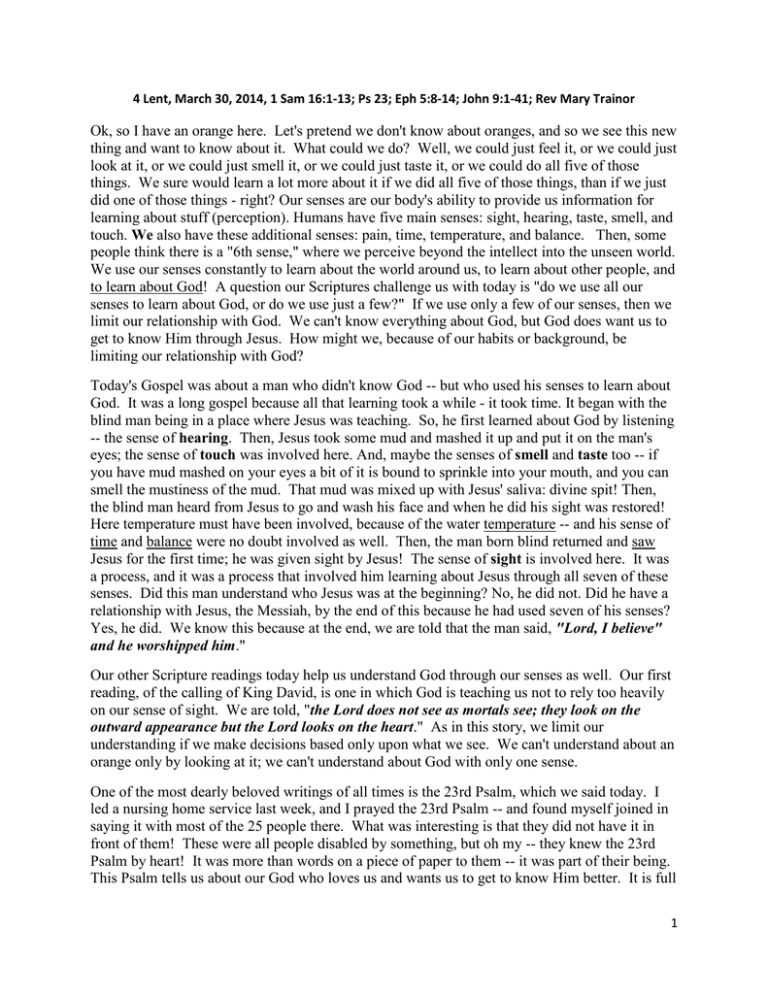
4 Lent, March 30, 2014, 1 Sam 16:1-13; Ps 23; Eph 5:8-14; John 9:1-41; Rev Mary Trainor Ok, so I have an orange here. Let's pretend we don't know about oranges, and so we see this new thing and want to know about it. What could we do? Well, we could just feel it, or we could just look at it, or we could just smell it, or we could just taste it, or we could do all five of those things. We sure would learn a lot more about it if we did all five of those things, than if we just did one of those things - right? Our senses are our body's ability to provide us information for learning about stuff (perception). Humans have five main senses: sight, hearing, taste, smell, and touch. We also have these additional senses: pain, time, temperature, and balance. Then, some people think there is a "6th sense," where we perceive beyond the intellect into the unseen world. We use our senses constantly to learn about the world around us, to learn about other people, and to learn about God! A question our Scriptures challenge us with today is "do we use all our senses to learn about God, or do we use just a few?" If we use only a few of our senses, then we limit our relationship with God. We can't know everything about God, but God does want us to get to know Him through Jesus. How might we, because of our habits or background, be limiting our relationship with God? Today's Gospel was about a man who didn't know God -- but who used his senses to learn about God. It was a long gospel because all that learning took a while - it took time. It began with the blind man being in a place where Jesus was teaching. So, he first learned about God by listening -- the sense of hearing. Then, Jesus took some mud and mashed it up and put it on the man's eyes; the sense of touch was involved here. And, maybe the senses of smell and taste too -- if you have mud mashed on your eyes a bit of it is bound to sprinkle into your mouth, and you can smell the mustiness of the mud. That mud was mixed up with Jesus' saliva: divine spit! Then, the blind man heard from Jesus to go and wash his face and when he did his sight was restored! Here temperature must have been involved, because of the water temperature -- and his sense of time and balance were no doubt involved as well. Then, the man born blind returned and saw Jesus for the first time; he was given sight by Jesus! The sense of sight is involved here. It was a process, and it was a process that involved him learning about Jesus through all seven of these senses. Did this man understand who Jesus was at the beginning? No, he did not. Did he have a relationship with Jesus, the Messiah, by the end of this because he had used seven of his senses? Yes, he did. We know this because at the end, we are told that the man said, "Lord, I believe" and he worshipped him." Our other Scripture readings today help us understand God through our senses as well. Our first reading, of the calling of King David, is one in which God is teaching us not to rely too heavily on our sense of sight. We are told, "the Lord does not see as mortals see; they look on the outward appearance but the Lord looks on the heart." As in this story, we limit our understanding if we make decisions based only upon what we see. We can't understand about an orange only by looking at it; we can't understand about God with only one sense. One of the most dearly beloved writings of all times is the 23rd Psalm, which we said today. I led a nursing home service last week, and I prayed the 23rd Psalm -- and found myself joined in saying it with most of the 25 people there. What was interesting is that they did not have it in front of them! These were all people disabled by something, but oh my -- they knew the 23rd Psalm by heart! It was more than words on a piece of paper to them -- it was part of their being. This Psalm tells us about our God who loves us and wants us to get to know Him better. It is full 1 of sights and sounds and textures and smells. As we recite it, we are right there in the green pastures and beside the still waters, and we sense the darkness of the valley of the shadow. Christianity is a religion of the Word: the written Word, the Bible, which we read. But the Word is also the person of Jesus: the Word made Flesh, who dwelt among us, who turned water into wine, who made the blind see and the mute speak, who washed the stinky feet of fishermen and broke bread with unsavory characters. None of our senses are to be left out when it comes to our relationship with God. We are to love the Lord our God with our whole heart and mind and soul and strength. At one point in church history a while back, there was a theological struggle about the use of the senses of hearing vs. seeing in church. For one time period seeing prevailed, and another hearing prevailed. After the Reformation, Protestant churches only emphasized hearing -- churches were halls to hear the sermon, and that was it. But gradually, we were given back stained glass windows and lights and pictures and crosses as visual reminders of God's presence; the eye and ears were engaged. Here at St. John's we have a variety of ways we worship God, intentionally engaging our senses: We move: we sit, stand, kneel, and walk in processions and do the Stations. We taste: we take Jesus into our bodies in Holy Communion. We feel: we touch Jesus when we reach out for the host, we touch each other as we pass the Peace, we put Holy Water on ourselves to remind ourselves of our Baptism. We smell: we smell the candles as they burn and sometimes we smell incense as it burns. We hear: we listen to the music and the bells, the Word of God preached. We see: we look at the crosses, the statues, the altar, each other -- and in them we see Christ. We are not talking emotions here, because God is here with us whether we feel Him around or not. Jesus said in Matthew 28: "Lo I am with you always." Psalm 34:8 says, "Taste and see that the Lord is good." Author Wendell Berry said that when we are not fully using our senses we are like "shipping containers that transport our brains and a few employable muscles back and forth." Oh my, we don't want to be like that with God - do we. In this Lenten season, will you be open to a deeper relationship to God through all your senses? God is in the Light, in the bread and wine, in the Word, in the mud, in each other! Be open to God's amazing grace in new ways. Amen. 2

